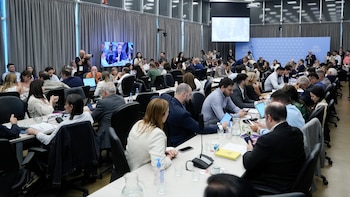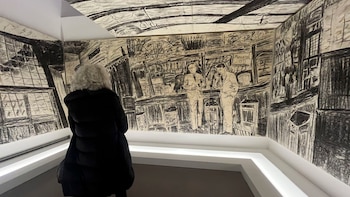
Around the Rings: First of all, how has it gone for PyeongChang this week at the debriefing? Do you think it’s been a successful event?
Jin Sun Kim: I believe that it was a good opportunity, a very useful opportunity for us. We’ve been studying a lot, particularly technical manuals, but this debriefing was a very practical study and we had informative discussions with Sochi and the IOC. It was a good education for us.
ATR: PyeongChang and Sochi are very different places. What can PyeongChang learn from Sochi? How can Sochi help PyeongChang?
JSK: Sochi and PyeongChang are quite different in terms of culture and climate, but we have a similar concept for the Games. We’re offering two clusters, like Sochi, so in this perspective, we learned from them. In terms of operations, I want to make sure of five parts: rapidity, accuracy, functionality, effectiveness, and convenience. Also, I would like to incorporate regional culture and tourism into the Games, so it has a festival-like concept.
ATR: Have you made changes in PyeongChang, and will you make changes in PyeongChang, based on what you’ve learned from Sochi?
JSK: We didn’t have any particular specific changes to the plans we already have, but we want to focus more on the safety aspects, especially in terms of facilities. Our volunteers will have respective posts, and they have knowledge about their post and the games as a whole, so if someone asked a question, they could immediately answer with proper knowledge.
ATR: If someone asks what PyeongChang means, they can answer that question?
JSK: If someone asks, "Where should I go?" or where something is is located, they’ll be able to answer.
ATR: What is the biggest challenge you face preparing for the 2018 Games?
JSK: There are two parts. First, to have an effective management of the timeline, so that every facility related to the games will be completed in time for test events and games, and also we want to implement a one-stop shop for developing and constructing facilities, and we’d like to operate a project management committee where experts get involved and give advice and take part. They will check, evaluate, and analyze the process. This last part would be closer to the games. We need to figure out how to fill stadiums during game times, so we’re looking into engagement campaigns and various PR campaigns.
ATR: As far as venue changes, are there any venue changes coming at this stage? I heard that in Gangneung City, questions are being raised about the speedskating oval and the ice arena there.
JSK: The changes have been a factor in Games preparation, but in terms of the ice hockey one venue, the plan was reviewed because we would like to make sure the venue would be cost-effective. For both venues, we needed to consider legacy use. Originally, the ice hockey one venue was planned to be deconstructed and moved to another location after the Games. The design part was no problem, and we’re not going to change that. The construction is ongoing, and we also plan to look into legacy parks and see if there are any better options if we can’t follow through. Because the legacy use in the speedskating venue is not cost effective, we’re discussing using a temporary concept for the venue. We’ll be redesigning the speedskating venue in consultation with ISU.
ATR: Will this be a temporary venue or a permanent venue now?
JSK: Originally, the plan was to have it as a permanent venue, but it wasn’t cost-effective, so we decided to include the option of making a temporary venue with the condition that the construction timeline could meet the test events deadline. We also needed to talk to the ISU and IOC. When all these conditions are met, we would be able to have a temporary venue. If not, than we would have to look into the original plan.
ATR: When I arrived here on Sunday, I was surprised to see all of the protest signs about the train station. It’s the first time that I’ve seen protests involved with the PyeongChang Olympics. When I came here before, people were having rallies in favor of the Olympics, but obviously, people are unhappy with the decision of the train station, but there’s nothing that can be done about that – the train station will not be built here, is that correct?
JSK: I can only speak for the games times operations of the train station. If the region wants to have a train station here to develop the area, that’s a regional decision. For Games time purposes, we held a review session and we did a feasibility study and it wasn’t reasonable to have a train station here. A large number of residents in this area understand the concept and the process we went through.
ATR: The protest signs were right next to the convention center. During the Olympic Games, will protesters be allowed to have signs in the same way?
JSK: Now it's okay, but it won’t be possible during the Games.
ATR: How about more foreign experts joining the PyeongChang team and hiring people who’ve worked in past Olympic games, as opposed to just having a Korean staff? What is the progress there?
JSK: We have a plan to recruit experts for needed positions, regardless of nationality, and that will be done step-by-step.
ATR: You had some good news yesterday about sponsors. You have your first domestic sponsors. What do you think the future holds? More sponsors coming?
JSK: Today, we’re announcing the sports apparel partnership. I’m satisfied with the results. With the visit of IOC president Thomas Bach and the two events going on, this will be the catalyst for our marketing program. After the Incheon Games, I think the marketing process will speed up a little bit.
Interview conducted by Ed Hulain PyeongChang
20 Years at #1: Your best source of news about the Olympics is AroundTheRings.com, for subscribers only.
Últimas Noticias
Sinner-Alcaraz, the duel that came to succeed the three phenomenons
Beyond the final result, Roland Garros left the feeling that the Italian and the Spaniard will shape the great duel that came to help us through the duel for the end of the Federer-Nadal-Djokovic era.
Table tennis: Brazil’s Bruna Costa Alexandre will be Olympic and Paralympic in Paris 2024
She is the third in her sport and the seventh athlete to achieve it in the same edition; in Santiago 2023 she was the first athlete with disabilities to compete at the Pan American level and won a medal.

Rugby 7s: the best player of 2023 would only play the medal match in Paris
Argentinian Rodrigo Isgró received a five-game suspension for an indiscipline in the circuit’s decisive clash that would exclude him until the final or the bronze match; the Federation will seek to make the appeal successful.

Rhonex Kipruto, owner of the world record for the 10000 meters on the road, was suspended for six years
The Kenyan received the maximum sanction for irregularities in his biological passport and the Court considered that he was part of a system of “deliberate and sophisticated doping” to improve his performance. He will lose his record and the bronze medal at the Doha World Cup.

Katie Ledecky spoke about doping Chinese swimmers: “It’s difficult to go to Paris knowing that we’re going to compete with some of these athletes”
The American, a seven-time Olympic champion, referred to the case of the 23 positive controls before the Tokyo Games that were announced a few weeks ago and shook the swimming world. “I think our faith in some of the systems is at an all-time low,” he said.




